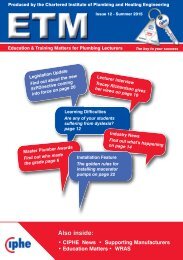Education & Training Matters
Aimed at Plumbing lecturers, published by the Chartered Institute of Plumbing and Heating Engineering.
Aimed at Plumbing lecturers, published by the Chartered Institute of Plumbing and Heating Engineering.
You also want an ePaper? Increase the reach of your titles
YUMPU automatically turns print PDFs into web optimized ePapers that Google loves.
QUALIFICATIONS<br />
QUALITY NOT QUANTITY<br />
Richard Evans, Chairman of the CIPHE’s<br />
<strong>Education</strong> and <strong>Training</strong> Group, gives his<br />
views on changing the status of plumbing<br />
and heating installers.<br />
Establishing the standard<br />
I worked in FE during the 1970s/80s/90s<br />
and witnessed a succession of funding<br />
regimes, which encouraged the ‘dash for<br />
cash’ and ‘bums on seats’. These insensitive<br />
funding approaches disadvantaged<br />
low recruiting/higher cost, but strategically<br />
important, technical and vocational<br />
programmes, which led to these being<br />
cutback. Departments were closed,<br />
merged or down sized, which resulted in<br />
skill shortages in key areas including<br />
plumbing. Many colleges chased high<br />
recruiting programmes, with a resultant<br />
over production of students graduating in<br />
such areas as media studies and beauty<br />
therapy. At present enrolments for nail<br />
technicians are at an all-time high!<br />
Sadly, the situation today continues with<br />
college budgets being cut and institutions<br />
finding it increasingly difficult to sustain<br />
technical subjects, even with the national<br />
promotion of apprenticeships. Long-term<br />
policies on vocational further education’s<br />
role are still absent; short termism rules<br />
and colleges are driven to maximise<br />
funding by marginalising low recruiting/<br />
high-cost courses in technical and<br />
practically based programmes.<br />
One critical factor involved in this debate<br />
is the level of the programme being<br />
offered and this is particularly important<br />
for plumbing and heating engineering. At<br />
present the normal level is set at 2, whilst<br />
other technical subjects are set at Level 3<br />
e.g. electrical programmes. Interesting to<br />
note that Scotland requires a Level 3 in<br />
plumbing before a person can enter<br />
employment. It is absolutely essential that<br />
the level is adopted universally at 3 in<br />
England. Plumbing and heating engineering<br />
is a complex and highly multi-skilled<br />
discipline, involving different materials and<br />
requires expert knowledge of the dangers<br />
of water and electricity. The continuing<br />
acceptance of Level 2 as the ‘norm’ for the<br />
subject is randomly discriminatory against<br />
the subject. The funding methodologies<br />
and sadly, the perception by some<br />
employers and college staff, encourage<br />
this lowest common denominator culture<br />
by supporting Level 2. If Level 2 continues<br />
to be offered and accepted by college<br />
management and employers as the norm,<br />
the professional will not gain the status it<br />
deserves.<br />
It is essential that Level 3 is established<br />
as the norm and Level 2 discontinued in<br />
order to align with other technical disciplines<br />
and give plumbing the status it<br />
deserves. Enhanced quality will come with<br />
a higher level.<br />
18 Summer 2015 ETM



